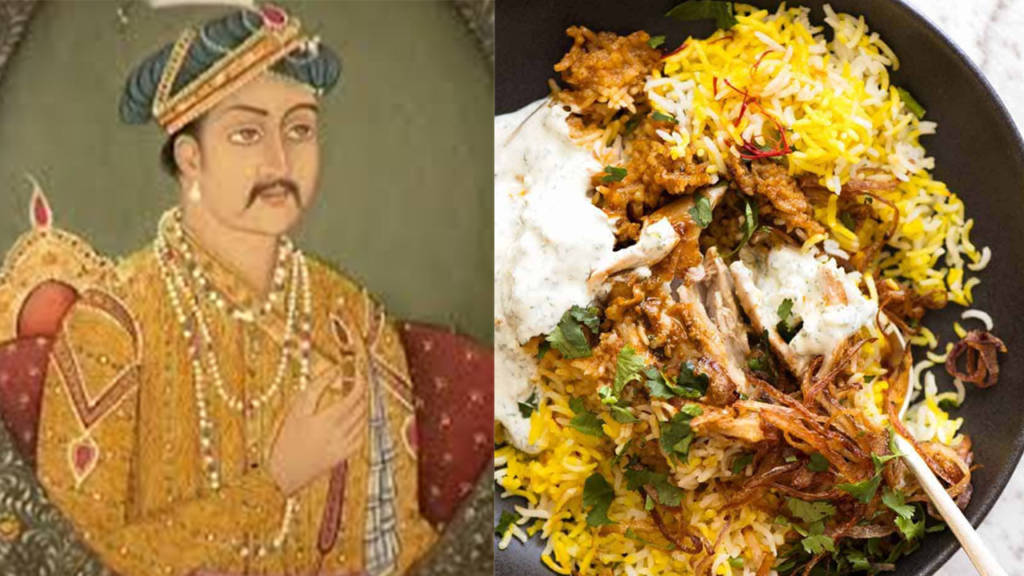When the trailer of Tanhaji streamed on YouTube, some people felt so aghast by the unapologetic portrayal of the Mughals, as well as their loyalists, that they began trending ‘#ThanksMughals’ on Twitter. In this trend, the people, stung by Tanhaji’s trailer focused specifically on how Indians should be thankful to the Mughals at all instances, and how Mughals enriched the Indian cuisine with their Mughlai style of cooking.
To describe one example, former journalist from ‘The Indian Express’, Irena Akbar took to her Twitter account and went on to describe in detail as to how the Mughlai cuisine made Indian cuisine popular around the world. She shared countless tweets of people supporting her trend, in order to explain as to how Biryani was created because of the Mughals, how Mughals brought to India the Mughlai parantha, Kabab, Seekh Kabab etc. In one tweet, she even went to say that Delhi was created because of Islamic rulers like Mughals. However, we shall come to this later.
Delhi was built by Muslim rulers, which included the Mughals.#ThanksMughals https://t.co/HN32GhWPOg
— Irena Akbar (@irenaakbar) November 20, 2019
#ThanksMughals https://t.co/JdyDgSU2FH
— Irena Akbar (@irenaakbar) November 20, 2019
As if toeing the line of Irena Akbar, the Indian Express also published an article recently, whose title was ‘From Babur to Jehangir, how Mughals enriched Indian cuisine’. To quote an excerpt from Kaushik Dasgupta’s article, “When Babur’s son Humayun was driven out of India by Sher Shah, he sought refuge in Persia. Unlike his father, the second Mughal emperor employed Indian cooks, who, according to Collingham, regaled the Persian ruler with a “dish of rice and peas, an Indian version of the khichuri”.
It went on to say that “Aurangzeb, was, in fact, so fond of khichdi that he gave the dish his name, the Alamgiri khichri,” and adds that “the potpourri of influences that is Indian cuisine would be poorer without what happened during Mughal rule. It’s not for nothing that “Mughlai” is a section in menus of a variety of eateries in the country — it’s another story that most do not do justice to the magic that happened in the Mughal kitchens.”
Joseph Goebbels had rightly said one, “Spread a lie so much that people start perceiving it as the truth.” The same applies in the case of Mughlai food. It is close to hilarious to label that cuisine as exclusive, which is almost close to insipid without the mixture of Indian spices and other food ingredients. To be frank, Mughlai food is not a real thing, because it practically doesn’t exist without the mixture of Indian cooking knowledge and ingredients.
First, we focus on the article by The Indian Express. In their bid to maintain religious harmony, the writer has probably revealed the hypocrisy of the article without any special effort. To be honest, the founder of Mughal Empire, Babur, was extremely hostile towards India and her culture, especially the Indian food. He liked the cuisine cooked in the way it was popular in Samarkand, and it is said that he missed the melons from his homeland quite a lot.
Babur himself mocked Indian culture in Babarnama, as he wrote, “Hindustan is a country of few charms. Its people have no good looks; of social intercourse, paying and receiving visits there is none; of genius and capacity none; of manners none; in handicraft and work there is no form or symmetry, method or quality; there are no good horses, no good dogs, no grapes, muskmelons or first-rate fruits, no ice or cold water, no good bread or cooked food in the bazaars, no hot-baths, no colleges, no candles, torches or candlesticks.”
Now if we talk about Mughals bringing Biryani to India, then Biryani’s real taste lies in the core ingredients, be it the Indian spices or the rice, which is almost impossible to find in the origin place of the Mughals, that is, modern day Uzbekistan. In order to grow rice, a temperate climate with adequate humidity is necessary. That is found mostly in South Asia, China and South-East Asia. As such, to say that it was Mughals who invented Biryani, is not only laughable but also extremely disconnected from reality. Imagine your beloved Biryani without the Indian spices and the rice.
The way the Indian Express has talked about the growth of Mughlai cuisine under Akbar’s reign are probably also forgetting that Akbar was heavily influenced by the flavours of the Rajasthani cuisine, and not only did he include them in the royal culinary, but also it was due to the mixture of some of those spices and other ingredients that the iconic Murgh Musallam came into existence. Can we still believe the existence of Mughlai cuisine without the presence of Indian food ingredients?
Now if we come to Irena Akbar’s statement, where in order to glorify the Mughals she even said that Delhi was established by Islamist rulers like the Mughals, this requires a special level of ignorance to be justified. The souls of Pandavas from Indraprastha, and Raja Anang Pal Tomar and Samrat Prithviraj Chauhan, who established the earliest regions of Delhi, like Dhilika and Qila Rai Pithora respectively, would be laughing their hearts out if they read the statements of Irena Akbar.
To be fair, the part of history which was carefully hidden by leftist intellectuals like Irena Akbar is now sprouting out in the open. Whatever they might do, but we’ve stopped taking white lies served in the name of history. Mughlai cuisine is nothing on its own, no matter how much propaganda one peddles in favour of the same.
